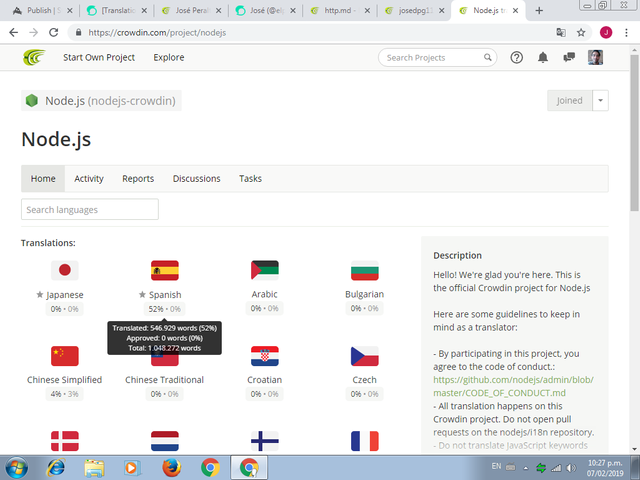[Translation][Spanish] Node.js (1060 words) (Part 35)
Project Details
Node.js is an open-source, cross-platform JavaScript run-time environment that executes JavaScript code outside the browser.
Node.js brings event-driven programming to web servers, enabling development of fast web servers in JavaScript. Developers can create highly scalable servers without using threading, by using a simplified model of event-driven programming that uses callbacks to signal the completion of a task. Node.js connects the ease of a scripting language (JavaScript) with the power of Unix network programming.
In easier to understand words: Node-js is a free platform whose goal is to provide its users the possibility to create lightweight and cost efficient web servers, how does Node.js do this?
Node.js handles web server connections in a way so they don´t take up as much space in a server, and thus, the owner of a project would not need to invest as much money in multiple servers to store so much information in Gigabytes.
Being an Open Source Project, Node.js possesses immense value for providing so much while at the same time being totally free.
Contribution Specifications
546,929 words have been translated so far in the Spanish folder of Node.js, which amounts to a total of 52% done in regards to the completion of the translation of this big project.
Translation Overview
In this contribution I started translating the second http.md folder of Node.js.
"HTTP" stands for "Hypertext Transfer Protocol", which refers to the communication protocol that allows information transfers to occur within the World Wide Web. HTTP was developed by the World Wide Web Consortium and the Internet Engineering Task Force, a partnership that ended in 1999.
HTTP defines the syntaxis and the semantics that utilize the software elements of web architecture (clients, servers, proxies) to communicate.
HTTP is a stateless protocol, which means that it doesn't save any information regarding previous connections.
A several number of the translated strings in this contribution explain the interactions that occur with events:
ENGLISH (1): During the [<0>'response'</0>][] event, one can add listeners to the
response object; particularly to listen for the <0>'data'</0> event..
SPANISH (1): Durante el evento [<0>'response'</0>][], se pueden añadir listeners al objeto de respuesta; particularmente para escuchar el evento <0>'data'</0> .
ENGLISH (2): The [<0>'response'</0>][] event is executed with one
argument which is an instance of [<0>http.IncomingMessage</0>][].
SPANISH (2): El evento [<0>'response'</0>][] se ejecuta con un
argumento que es una instancia de [<0>http.IncomingMessage</0>][].
ENGLISH (3): Note that when this event is emitted and handled, the [<0>'request'</0>][] event will
not be emitted.
SPANISH (3): Tenga en cuenta que cuando este evento sea emitido y manejado, el evento [<0>'request'</0>][] no será emitido.
ENGLISH (4): As with all <0>'error'</0> events, if no listeners
are registered the error will be thrown.
SPANISH (4): Como con todos los eventos <0>'error'</0>, si no hay listeners
registrados se arrojará el error.
I also translated a couple of strings that explain the different usages and descriptions of headers:
ENGLISH (1): Use an array of strings
here if you need to send multiple headers with the same name.
SPANISH (1): Utilice aquí una matriz de strings
si necesita enviar varios encabezados con el mismo nombre.
ENGLISH (2): If this header already exists
in the to-be-sent headers, its value will be replaced.
SPANISH (2): Si este encabezado ya existe
en los envíos de encabezados pendientes, su valor será reemplazado.
ENGLISH (3): Header names are not lowercased, and duplicates are not merged.
SPANISH (3): Los nombres de los encabezados no están en minúsculas, y los duplicados no están fusionados.
In this contribution, the new concept I learned about while working on this subfolder was protocol:
In object-oriented programming, protocols refer to the means by which unrelated objects communicate with each other.
Also, protocols are the description of:
- The messages that an object comprehends.
- The arguments through which these messages can be provided.
- The types of results that these messages return.
- The invariants that are preserved despite the modifications of any given object state.
- The extraordinary situations that will require to be handled by the clients to the object.
Words translated on this contribution, on http.md

Here's the link to the http.md folder:
Languages
The project's source language is English and it is being translated into Spanish.
Also, Node.js is currently being translated into other 32 languages. I´m contributing to making this project accessible to the Spanish speaking community online.
Besides collaborating as a translator for Open Source Projects on Crowdin I also work as a Freelance Translator for a law firm in the US, I've been working for that company for one year and two months, translating sworn statements and legal documents from English to Spanish and viceversa.
Open Source Projects I've worked on and contributed to as a translator:
5 . Node.js
Word Count
Part 1: 1016; Part 2: 1026; Part 3: 1035; Part 4: 1092; Part 5: 1050; Part 6: 1147; Part 7: 1133; Part 8: 1049; Part 9: 1090; Part 10: 1093; Part 11: 1024; Part 12: 1102; Part 13: 1085; Part 14: 1049; Part 15: 1035; Part 16: 1059; Part 17: 1041; Part 18: 1114; Part 19: 1114; Part 20: 1033; Part 21: 1030; Part 22: 1059; Part 23: 1047; Part 24: 1070; Part 25: 1151; Part 26: 1039; Part 27: 1025; Part 28: 1035; Part 29: 1063; Part 30: 1037; Part 31: 1047; Part 32: 1023; Part 33: 1041; Part 34: 1064; Part 35: 1060
Total of words translated so far: 37115
Proof of Authorship
The first part of this translation contribution was submitted via Crowdin on January 28th and completed on February 7th.
For further Proof of Authorship in regards to this contribution you can see my activity on Crowdin here

Greetings, @elpoliglota. Thanks for submitting your contribution!
Congratulations on this collaboration!
Your contribution has been evaluated according to Utopian policies and guidelines, as well as a predefined set of questions pertaining to the category.
To view those questions and the relevant answers related to your post, click here.
Chat with us on Discord
Thank you for your review, @alejohannes! Keep up the good work!
Hi @elpoliglota!
Your post was upvoted by @steem-ua, new Steem dApp, using UserAuthority for algorithmic post curation!
Your post is eligible for our upvote, thanks to our collaboration with @utopian-io!
Feel free to join our @steem-ua Discord server
Hey, @elpoliglota!
Thanks for contributing on Utopian.
We’re already looking forward to your next contribution!
Get higher incentives and support Utopian.io!
Simply set @utopian.pay as a 5% (or higher) payout beneficiary on your contribution post (via SteemPlus or Steeditor).
Want to chat? Join us on Discord https://discord.gg/h52nFrV.
Vote for Utopian Witness!